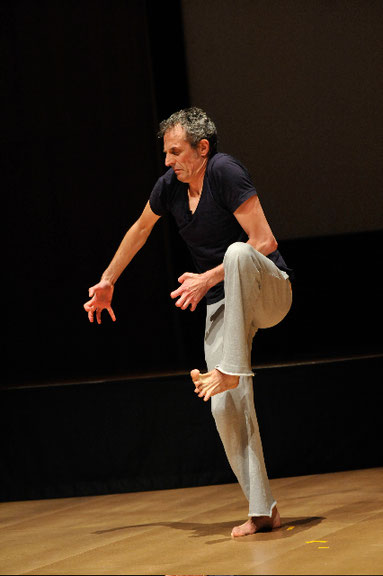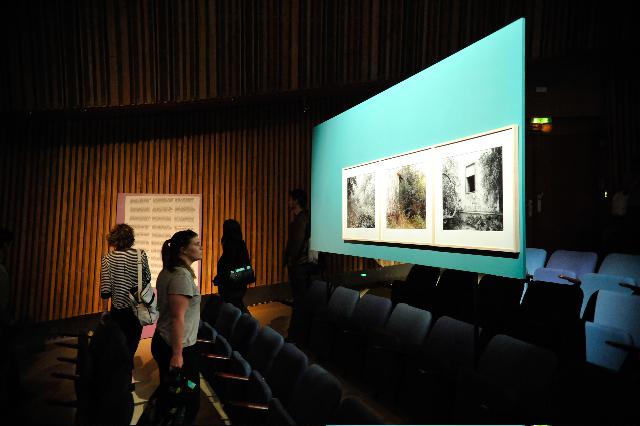Issue 4/2010 - Net section
Attending to reality
The first newly established Documentary Forum has been held in Berlin
The programme at the Berlin Documentary Forum, held for the first time in early June 2010, aimed to over-extend audiences. Artistic director Hila Peleg self-confidently placed her bets on concentrated attention developing over hours and hours rather than on distraction, events, festival logic or installations – and was astonishingly successful with this approach. Seven curators, including Catherine David and Okwui Enwezor, filmmakers Eyal Sivan and Florian Schneider, video artist Angela Melitopoulos and Eduardo Thomas, curator of the Mexican documentary film festival »Ambulante« were invited to place their own emphases in their sections of the programme. Four days from twelve noon to twelve midnight: film screenings, dialogues, discussions, readings, performances, lectures. The monstrous main theatre of the Haus der Kulturen der Welt was revamped in a few deft moves by Jesko Fezer, Anita Kaspar and Andreas Müller, the »Kooperative für Darstellungspolitik«, into an elegant, appropriate and multifunctional space.
A space that was conceived in terms of cinema yet at the same time was open to every possible form of presentation and reflection seeking to grasp and develop theories about film and dealing with documentary images across the broad spectrum of their contemporary platforms in various media. This proved a decisive framework, for on the one hand it helped ensure that this was not just another documentary film festival, whilst at the same time affirming vis-à-vis the art establishment the projection quality and time that cinema requires.
»What interests us today, as we have already noted with reference to filmic documentary is less the image in itself and what it imposes than the real it can produce. (...) The open image testifies to a necessarily incomplete, non-definitive activity of interpretation, which implies and indicates an irreducible »off-screen«. Catherine David expressed her interest in the documentary approach in those terms in 1997 in »documents« and opened up documenta X to filmmakers like Harun Farocki, Raoul Peck, Abderrahmane Sissako, Charles Burnett, Gordon Matta-Clark or Chris Marker. When Okwui Enwezor continued this approach five years later, there was, on the one hand, talk of a »documentary turn« in art, yet at the same time a sense of proximity to film was established. Since then the debate has gone back and forth. Some documentary filmmakers found that the art world offered an escape route to flee the patronising constraints of public broadcasting TV formats – new, though not necessarily better, possibilities for production. In the process the eternal argument about alleged truth and objectivity was replaced by the mantra of highlighting the fragile border between documentary and fictional truth, and the notion of deconstructing the documentary. Peleg elegantly avoided this issue with the approach adopted by the Documentary Forum, for she turned the spotlight not on the documentary image but rather on documentary practice, and viewed this practice as per se political in its relationship to reality. The Documentary Forum thus sketched out a framework within comprehensive approaches to documentary practices, from Omer Fast to Joachim Koester, from Rabih Mroué to Xavier Le Roy, from Frederick Wiseman and Marcel Ophüls to Michael Mrakitsch, and sought in the first festival to do no more and no less than to take stock.
De- and rearchivisation
Documentary film, it is said, has a particular relationship to the unexpected, unpredictable and incalculable. Florian Schneider thinks in terms of the process of making films, not in terms of the finished product. Whilst feature films, where the narrative is prefabricated, in a sense pre-empt the event, the documentary film always comes into being after the event, after shooting, in the editing suite. »Documentary methodology deals with re-appropriating reality. This kind of ownership creates obligations in the truest sense of the term, it calls for responsibility. That is the only way that the event can ultimately exist and begin to insist: independently of an author, actualised in the desire of each viewer. Against this backdrop it is not particularly interesting to introduce further modulations into the borderline between the fictional and the documentary«.
Eyal Sivan shifts the notion of responsibility, including his responsibility as the author of a work, and takes Jean-Luc Godard at his word: »An author has no rights. I have only duties«. In a frequently quoted interview with the magazine »Les Inrockuptibles«, Godard brushed aside the notorious question of copyright when talking about his recent »Film Socialism«. Sivan considers that the author’s duty involves taking up the challenge of attending to the innumerable existing films and images, which are constantly piling up ever higher in digital and analogue archives. Making selections and articulating connections becomes a political action in the broad field of what has become indiscriminate accessibility. The issue is how to save films, so that they do not simply become classics, statues and instead begin to circulate and be seen again, bringing our view of them up-to-date against the backdrop of their anachronistic relationship to a long-forgotten contemporaneity. That means that the documentary moment is constituted by creating, out of what already exists, possibilities and underpinnings to form a fictional moment, and in respect of the archive, to form a narrative. Sivan used the framework of the Documentary Forum to write a possible history of documentary film from 1950 (»Guernica«, Alain Resnais) to 1976 (»The Memory of Justice«, Marcel Ophüls) as a history of emancipation from the various different voices of power over the various decades.
In his view, a process of de- and rearchivisation is necessary to liberate images and films, which are often reduced to a simple tag or key word. Sivan dreams of a search engine that would allow users to find images by means of and via images, rather than using terms and words as search criteria, for these in turn depend on classifications effected by others. Ariella Azoulay, who is an artist and scholar of photography theory, develops her arguments from a similar point of departure. The political notion of the refugee can be neither depicted nor represented, yet nevertheless images in which we believe we are seeing (Palestinian) refugees codify a notion of the refugee as victim. Our almost automatic reaction to photography, to images as a means of representation, directly associated with terms and key words, renders us blind to the constructed nature of the situation and the image, and blind to what could be seen.
Michael Mrakitsch, the »Dostoyevsky of documentary film«, as the »Süddeutsche Zeitung« once called him, constantly argues against the images shot by his camera man. In particular in his films about Djibouti, »Djibouti or The guns aren’t loaded – only by night« (1973) and »Djibouti – Revisiting an Invention« (1973/1991), he insists, as virtually no other filmmaker has done, on persistently articulating an awareness of the limits of the image within the frame, along with a sense that attempts to portray and grasp a country like Djibouti are doomed to failure. It is a cliché that presents itself to him. It is impossible to depict what we know about the specific details of the country’s colonial history and Mrakitsch therefore heightens the tension between reality and images of that reality almost to breaking point. This can however only be achieved with the help of text, a language that goes beyond the image per se and opens it up. Mrakitsch demonstrates above all what was and would be possible on television and consciously aimed his hard-to-digest documentary films at this mainstream medium. »Missing Image«, the programme curated by Florian Schneider, concentrates on four films by Mrakitsch, who almost no-one has even heard of. Here Mrakitsch represents a generation of documentary filmmakers who worked exclusively for television and were rapidly forgotten after their work was broadcast, despite sometimes magnificent reviews in the daily papers – filmmakers who did not even own the rights to their films. Piles of these films are now gathering dust in broadcasters’ archives.
How can we find an appropriate response to the question of what documentary practice signifies for digitally networked practice in its relationship to the incalculable and complex interplay of image, text and information, along with an openness that is up to the task of drawing our attention to a particular reality, moving beyond a seductive multiplicity of links and search terms? That question, generally unresolved, has not yet been answered by the Documentary Forum either. One thing has however become clear: documentary practice must be constantly reinvented, irrespective of the physical medium deployed, in order to continue raising its insistent voice.
Berlin Documentary Forum, 2nd to 6th June 2010, Haus der Kulturen der Welt; the excellent documentation of the Forum is available online:
http://hkw.de/berlin.doc.forum
www.documentary.org/content/berlin-documentary-forum
Translated by Helen Ferguson



